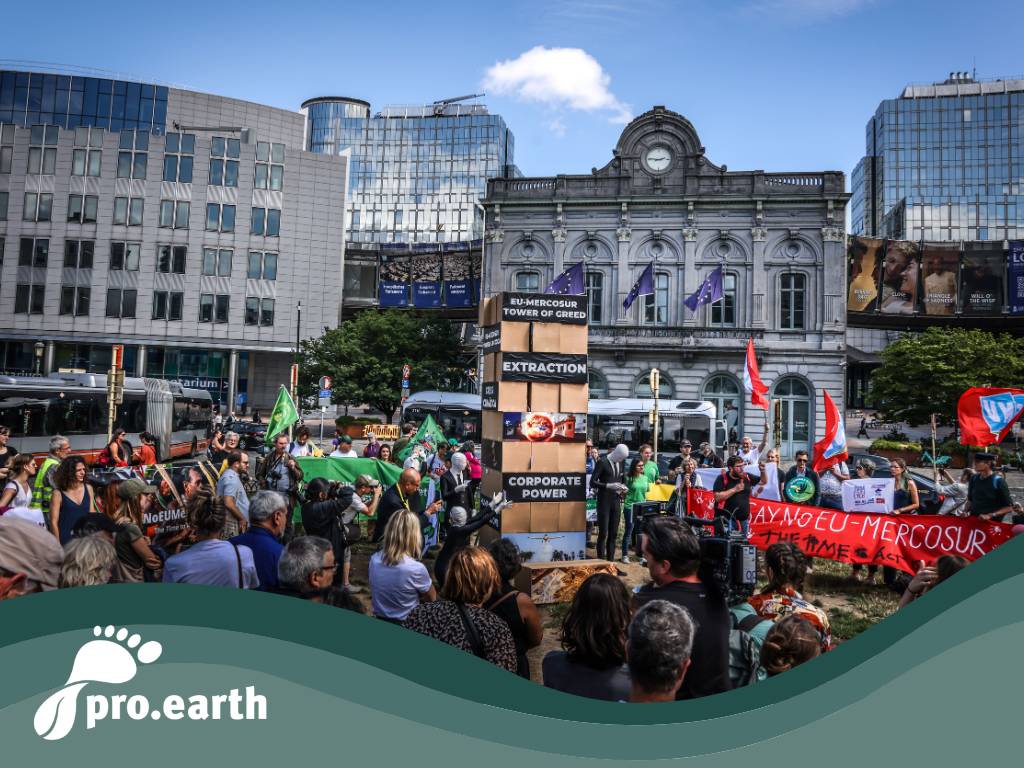Protests in Brussels against EU-Mercosur pact

The first EU-Latin America and Caribbean summit since 2015 began yesterday in Brussels, attended by all 33 heads of state whose countries belong to the Community of Latin American and Caribbean States (CELAC). EU Commission President Ursula von der Leyen stated that the EU wants to get the Mercosur agreement signed and sealed as soon as possible. At the same time, Greenpeace protested in Brussels yesterday together with a coalition of more than 50 organizations, the civil society alliance "Stop EU-Mercosur", against the controversial EU-Mercosur, EU-Chile and EU-Mexico trade agreements.
During a protest action, they brought down a three-metre-high "Jenga" cardboard tower made of illustrated blocks, highlighting the dangers of the agreement for the environment, agriculture and human rights. Greenpeace is calling on Austrian Chancellor Karl Nehammer, who is also attending the summit, to clearly reject EU-Mercosur.
The aim of the agreement
Von der Leyen emphasized: "Our goal is to resolve all remaining points of contention as quickly as possible so that we can conclude this agreement, which will benefit both sides. It is intended to reduce tariffs and create one of the largest free trade zones in the world with more than 700 million people. But so far the South Americans are resisting proposals for an additional declaration to the agreement."
Now that China's influence in Latin and South America has grown significantly and it has secured important raw material deposits and strategic infrastructure, the EU appears to be under greater pressure in this regard and wants to secure its share of raw materials such as hydrogen, copper and lithium. These are also urgently needed for the energy transition, including for the production of batteries for electric cars. However, this agreement - which has been under negotiation for 25 years - has come in for a great deal of criticism.
The aim of the EU Commission and the Mercosur countries (Argentina, Brazil, Paraguay and Uruguay) is to agree on an additional protocol at the summit to supposedly protect the environment, climate and human rights in EU-Mercosur. But the devil is in the detail: a leak of the package insert already showed that environmental violations, for example, would not result in any sanctions. To date, Brazil's President Luiz Inácio "Lula" da Silva has rejected the additional environmental protocol to the free trade agreement between Mercosur and the EU because the powerful agricultural lobby is holding a gun to his head. Nevertheless, he also expects the agreement to be finalized in the coming months: "We want to conclude a balanced Mercosur-EU agreement this year. This will open up new horizons and enable both sides to tackle current and future challenges."
Protests and criticism from civil society
"These three deals have a lot in common. They are poison for human rights, climate protection and for all of us as consumers. Instead of involving the population, new rules are being imposed from above that only serve the interests of corporations and major investors. We demand an immediate halt to all these negotiations and a complete restart for a trade policy that is appropriate to the social and ecological challenges of the 21st century," explains Roland Süß, member of the Attac coordination group.
"An agreement on EU-Mercosur would be fatal. The agreement exploits the environment, takes no account of human rights and puts domestic agriculture under massive pressure. Federal Chancellor Nehammer must do everything in his power to stop this catastrophic pact," says Melanie Ebner, agriculture spokesperson for Greenpeace in Austria.
We have already written about this in detail - see the following article.
https://news.pro.earth/2023/06/02/die-problematik-des-eu-mercosur-abkommens/
Claims
What all the protests have in common is the demand for a genuine renegotiation of the treaty based on current knowledge and taking into account climate change and the Paris 1.5-degree target.
Our pro.earth.conclusion:
There is still resistance to the agreement within the EU itself from some countries, including Austria. However, as an observer of the situation, it seems to me that there is a strong will on the part of politics and business - perhaps also due to the strong competition from China - to get this agreement through at all costs. Also in order to secure sufficient raw materials that we need for a "greener" future. We are acting and thinking from within a system that is in the process of destroying the basis of our existence. Someone once said: More of the wrong thing is still wrong! The profound rethink that we need to overcome this global crisis has not yet reached the system. In us humans. I can't exempt myself from this. More of the wrong things. But there is hope: the calls, the protests, the actions of civil society are getting louder, more and more. More and more people want out of the wrong. Let's dream that a new treaty based on our knowledge, the SDGs and the Paris climate goal will become a reality and improve the lives of many people while protecting the environment. A dream!
Foto©️Greenpeace Johanna de Tessieres
Further links
https://news.pro.earth/2023/06/30/neue-studie-zu-auswirkungen-des-eu-mercosur-abkommens/






